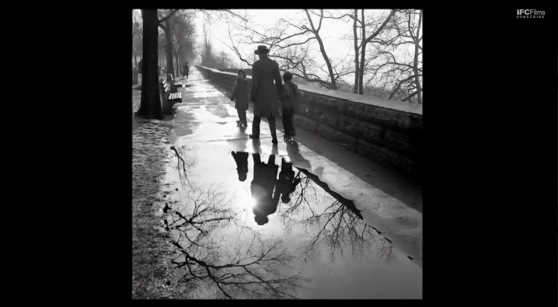18/31: Finding Vivian Maier

Screen: Sundance Selects
I watch many many documentaries, so I think a lot about the relationship between form and function, build and subject.
If you have a compelling enough subject, do you need to put the movie itself together well? If you pace your film properly, can you disguise the fact that your idea isn’t very interesting? Is a documentary film journalism, or art — or the art of journalism?
“Probably”; “sometimes”; “it depends”; the “welllllll”-ness of the answers means that, though I consider these questions, I don’t necessarily care about them, in the sense of counting them for or against a non-fiction film. One of my first entries in #31films this year, In A Town This Size, is unattractive and clumsily assembled, but compare that with — to choose an example that’s likely unfair, but bear with me — yesterday’s film, The Theory Of Everything, whose by turns soaring and sighing soundtrack never stopped telling me how to feel and successfully manipulated me close to tears several times. It’s “better,” I suppose, for a film to look attractive, but Brown’s film is so bad at selling itself as a high-quality piece of filmmaking that you really can’t feel like you’re getting sold to on the storytelling. If that makes sense.
All this by way of saying that Dana Stevens is not incorrect to characterize Finding Vivian Maier as “a film about a brilliant and near-forgotten artist” made by a man who “come[s] off in the movie as a self-aggrandizing, privacy-invading twerp.” John Maloof is nearly choked with self-regard at times, and evidently both overstates his importance to the discovery of Maier’s work — Maier, a private and opaque nanny prone to dressing like a vintage New Yorker cartoon, was also the Dickinson of photography, taking hundreds of thousands of beautiful photos and never sharing (or even developing some of) them — and underplays how invasive Maier herself would have found his crusade to bring her art to a wider (which is to say any) audience after buying a box of her negatives at auction. (Maier died in 2009.)
FVM is also a bit clumsy, mostly via thinking it isn’t, with pretentious overhead compositions of Maier’s many boxes and bags of film and cassettes and ticket stubs, and pointed “see, I cared so much about this topic that I taught myself to matte and be a docu DP” cutaways to Maloof during interviews. The opening montage of awkward silences almost says something about Maier’s native aloofness and privacy, but ends up saying more about Maloof not trusting his subject. And the attempt to give Maier an arc of sorts is not smooth, as we go from hearing about Maier’s compositions and sweet quirks to testimony from some of her later charges about her near-abusive behavior.
Stevens finds all that detestable, particularly in light of the movie’s Academy Award nom, and I can see that point of view, but for me, the flaws in the film don’t take anything away from the fascination of the subject, of her beautiful portraits, the frequent look of startlement on her subjects’ faces, the crying children who can at the same time look at Maier and her Rollei curiously. Maloof is awfully proud of himself, but I like seeing basic genealogy/Google detective work unfold; it’s not easy to keep momentum with that sort of story, poring over censuses to try to see what went on in the ten years between — but it’s what I did for a living for a few years, so it’s nosy and smugly done, I guess, but also I get it.
Finding Vivian Maier is really two movies, itself and Congratulating John Maloof, and I wouldn’t mind seeing a follow-up film that’s basically “…that fucking guy,” but then, you don’t have one without the other. You don’t have the horrible sweetness of Dear Zachary without Kurt Kuenne almost weeping during his voice-over. You don’t have Stevie without Steve James struggling with his own guilt. You don’t have any issue Michael Moore ever brought to light or made you mad about without all the issues about Moore that ever came to light or made you mad. Whatever the reason, whoever benefits, Finding Vivian Maier had my full attention for 84 minutes. Maloof stood on the shoulders of a giant to do that; stipulated. But I was looking at the giant.
Tags: 31 Days 31 Films Dana Stevens Dear Zachary documentaries Finding Vivian Maier In A Town This Size John Maloof Kurt Kuenne Michael Moore movies Patrick V. Brown Steve James Stevie The Theory Of Everything Vivian Maier





People seem to not know about another movie about Vivian Maier that’s super insightful to her as an artist. It’s really a must-see for any fan of her work. http://www.vivianmaiermysterymovie.com
I particularly like your documentary reviews and recommendations (you are the reason I’ve made my entire family watch Dear Zachary. They say, “Thanks”…. Heh). Anyway, lately my daughter and I have been watching ESPN’s 30 for 30 series and I have to say, the ones that we’ve watched so far have been really well made. For me, Hillsborough was a stand out. I thought the way that they built and framed that story was excellent. Thanks for all the recommendations over the years!
My pleasure! And I agree that the Hillsborough one is very well done.
Not sure if you’ve seen it, but if you like documentaries about artists, highly highly recommend Marwencol. A truly amazing film.
I did see it and adored it. Highly recommend it: https://tomatonation.com/culture-and-criticism/marwencol/
[…] Sarah D Bunting @ Tomato Nation […]